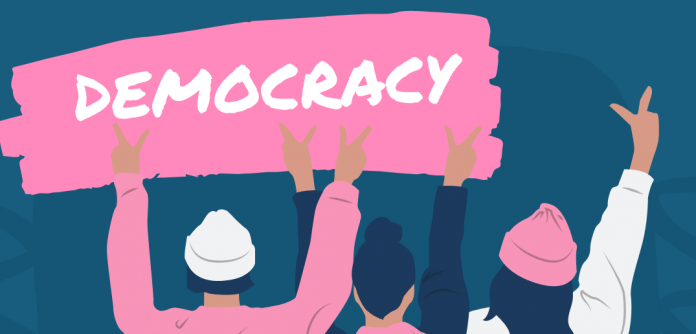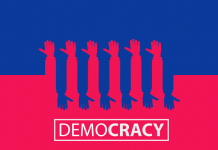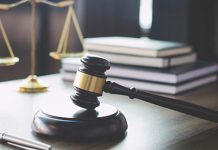The article is written by Tejaswini Kaushal, a student at Dr. Ram Manohar Lohiya National Law University, Lucknow. This article deals extensively with the features of democracy, both in the international and Indian contexts.
This article has been published by Sneha Mahawar.
Table of Contents
Introduction
As Abraham Lincoln famously expressed, democracy is a “government of the people, by the people, for the people”. Democracy is the rule of the people. Its fundamental tenet is that the populace elects a government through frequent, transparent, and free elections. In the history of civilisation, democracy has been essential in transforming the globe from monarchical, imperial, and conquest-based power structures to ones of popular rule, self-determination, and peaceful coexistence. The only known system of government in the world that promises to instill the concepts of equality, liberty, and fairness is a democracy, where citizens make decisions for the nation. The government functions on the basis of discussions and negotiations to develop policies and make choices for the nation, with the people having the ultimate authority to select their representatives, allocate responsibility for the nation’s affairs, and voice their disapproval. This article discusses the features of democracy in international and national contexts.
Concept of a democracy
‘Democracy’, as a term, has Greek origins, where ‘dēmos‘ means ‘people’ and ‘kratos‘ means ‘rule’. A democracy is a system of government in which the people have the power to make laws, i.e., ‘direct democracy’ and decide who will represent them in office, i.e., ‘representative democracy’. In a democratic society, the population has generally increased over time. However, who is regarded as ‘the people’ and how power is distributed among or delegated by the people has evolved through time and at different rates in different countries. Freedom of assembly, association, property rights, freedom of speech, inclusivity and equality, citizenship, consent of the governed, voting rights, freedom from unjustified governmental deprivation of the right to life and liberty, and minority rights are among the foundational principles of democracy.
Democracy has seen significant change over time. Direct democracy was the first type of democracy. A representative democracy, such as a parliamentary or presidential democracy, is the most prevalent type of democracy in use today. In this type of democracy, the people choose the representatives who will represent them in the government. In the most prevalent form of liberal democracy, the majority’s power is exercised within the parameters of representative democracy, but the Constitution restricts the majority’s power and defends the minority, typically by ensuring that everyone has access to certain individual rights, such as freedom of speech or freedom of association.
General features of a democracy
Liberty, Equality and Fraternity
The ideals of the first French revolution, i.e., “Liberty, Equality, and Fraternity” were immortalised as some of the essential features of a democracy. This phrase stands for the fundamental principles of democratic political systems. Absolute kings’ and emperors’ rule has frequently produced peace and order, albeit at the expense of individual liberties. The idea that an ordered society may exist while preserving freedom is supported by democratic principles. But there must be a balance between the law and freedom.
The presence of a Constitution
Every democratic country typically has a written or verbally recorded constitution. A constitution is simply the core set of laws or regulations that govern a state or society. It creates and outlines the functions of the legislative, executive, and judicial branches of the government. The rights and obligations of the government and the populace are also outlined in the constitution.
It is crucial to remember that there are two different kinds of institutions: formal and informal. Formal directives are those that carry out formal duties, like the three organs of government. On the other hand, informational institutions are those that carry out unofficial duties, like political parties and the press. In a democracy, these institutions are often defined by the constitution.
Rule of Law
The rule of law is a system, procedure, institution, practice, or standard that upholds the equality of all people in front of the law, ensures a form of governance that is not arbitrary, and more generally, forbids the arbitrary exercise of power. The rule of law is present in democracies. It denotes the rule of law as absolute. The rule of law cannot ever be violated.
Popular participation in politics
Popular participation in politics is one of democracy’s key characteristics. Given the definition of democracy provided above, it is obvious that any system that discourages citizens from participating in political decision-making is not a democracy. Hence, widespread participation is a fundamental component of democracy rather than just a characteristic of it. Either directly or through a representation they genuinely recognise, people must take part in politics.
Legitimacy
According to the Oxford Dictionary, democracy occurs when people follow the rules or the law. Political scientists define legitimacy as the right and acceptability of authority, typically a governing law or a regime. In simple terms, legitimacy is the acceptance of a state’s citizens and the authority of its leaders to govern. The people have the right to choose who will represent them in government in a democracy. The people will decide on who will run their political affairs in this place by a unanimous vote.
Voting is typically used for this, and it is recognised by the law that the populace has approved. Evidently, this is the reason why Abraham Lincoln asserted that democracy is a form of government that is run by, for, and for the people. This suggests that citizens are crucial in a democracy.
Periodic elections
In a democracy, the people are in charge. Thus, elections are often held every certain number of years. This is done to prevent the state’s political power from being concentrated in a single hand. For instance, in the United States of America, the President is chosen indirectly and serves a maximum of two four-year terms.
It is important to highlight that frequent elections are a crucial component of democracy because a state cannot be said to be democratic if just one person is in charge of running its operations forever. The people, who are supreme, must be given the freedom to select and replace their leaders.
Free and fair election
All adult citizens of the nation must be granted the right to vote in these elections, which must also be completely transparent and impartial. Every vote needs to be appreciated, and each vote needs to have the same weight when choosing representatives. Every democracy must meet this requirement since, even today, some nations deny the right to vote to women and people of non-binary sexual orientation. As a result, they are fundamentally no longer a democracy, rendering the very idea of elections useless. So, not only regular but also free and fair elections are essential.
Separation of powers
The notion of separation of powers was developed by the French social and political philosopher Charles-Louis de Secondat, baron de La Brède et de Montesquieu, in the 18th century. It implies that a state’s political authority should not be centred on one individual. To avoid authoritarianism, it should instead be split up and severed. Here, the branches of government share the political authority of the state, i.e., the Executive, the Legislature, and the Judiciary. The state’s laws are created by the legislature. The court interprets the law while the executive carries it out. These authorities are kept apart so that their operations won’t be hampered. Governmental branches are only permitted to monitor one another’s actions to verify that they all adhere to the laws that the populace approves of.
Check and balances
Further development of the principle of separation of powers is the concept of checks and balances. It was argued by Montesquieu in “The Spirit of the Laws,” his book, that the greatest method to avoid this is through the division of powers, in which various governmental entities exercise legislative, executive, and judicial authority, yet all of these bodies are governed by the law. According to research, Montesquieu’s notion of checks and balances is a governing philosophy in which certain departments of government are given the authority to stop other branches from acting and are encouraged to share power.
In the same vein, the existence of checks and balances in a democracy ensures that the various branches of government are held accountable for their actions. It should be remembered that each branch of government needs autonomy to act independently, within the bounds of the law, in order for the checks and balances mechanism to work. Financial autonomy is also crucial to ensure the effectiveness of checks and balances in a democratic government.
The existence of political parties
A political party is an association of like-minded individuals who unite to seize power. Political parties should exist in a democracy. Not just one, but two or more political parties. This will guarantee that the general public has a variety of options. Because there is only one political party in a one-party state, it cannot be said to be a democratic state. The populace, therefore, has no genuine choice.
According to the democratic tenet that the people are supreme, they have the authority to choose who will handle their political issues. On the other hand, a state is not democratic if there is only one political party or none at all, or if the populace is not free to choose their own leader.
Rule under a democratic nation
The prevailing government is not king in a democratic nation. According to the country’s constitution, the legislative branch is the one with the most authority. A new administration that is elected after a predetermined amount of time only has the authority to make decisions, carry them out, and make changes to a part of the existing laws. All of these actions must be done in accordance with the laws of the nation, which are independent of the governing administration. Citizens of the nation are appointed to these positions based on their qualifications and merit.
State’s obligation
The elected government has a duty and obligation to act in the interests of the general populace. All actions taken during the elected party’s session are the responsibility of the entire council, not just one leader. Democracy enables the entire council, rather than just one person, to make the choice.
Equity before law
Equity before law exists in a true democratic state. This style of government does not support the notion that certain groups of people should or should not be held accountable for their deeds. Even the legitimate leaders of a democratic state are subject to the law while serving the country or afterwards.
Because it assumes that citizens have the same rights to vote and to be elected, equality is a crucial component of democracy. This indicates that every vote cast in an election in a democracy is legitimate, regardless of the voter’s income or status. This is what is meant by equality.
Representation of minorities
Minorities exist in every country on the planet for one reason or another. Giving all of its inhabitants equal citizenship rights is one of democracy’s most salient characteristics. Minorities should not be oppressed or excluded, and the government should do all within its power to ensure that they enjoy an equitable standard of living. Additionally, some democracies throughout the globe allocate minority groups’ representation posts proportionate to the size of their populations while leaving the other positions up to the competition.
Fundamental human rights
Fundamental human rights are also very significant aspects of a democratic state. They are those unalienable, unchangeable rights that are bestowed upon a citizen of a state at birth. These rights aid in defending the people of the state from the abuses of autocrats. This is why the fundamental human rights of people in a democratic state must be entrenched in the constitution of every state. Fundamental human rights also contribute to the efficient exercise of democracy. One of them is freedom of the press. Evidently, one of the fundamental tenets of a democratic state is press freedom.
Freedom of speech, expression, and personal liberty
A democracy that stifles or withholds the public voice is invalid and violates one of democracy’s fundamental tenets. Even if the public’s voice is critical of the governing party, it should be allowed to be heard openly so that individuals can express themselves without fear of retaliation. In a similar vein, a citizen of a democratic nation should be free to act independently and according to their own judgement, so long as they do not endanger the country’s laws or any other individuals. It should be permitted to express one’s disapproval of anything, as this is essentially the only way to hold the government’s leaders accountable for their acts and policies. By doing so, the state completely undermines the power of a group of people, rendering the idea of democracy itself meaningless.
Freedom of press
Because the press plays a vital role in a democracy, press freedom is another fundamental characteristic of all democracies. First of all, adhering to this principle permits the public to freely establish print and online media outlets to report on and dissect governmental acts. One of the foundational principles of democracy is that it promotes accountability in government.
Without press freedom, there can be no democracy since the government will barely be held responsible for its activities since it will be obvious that no one is keeping an eye on them and disclosing them. Some of the most corrupt nations in the world today are found in Europe and Africa.
However, it should be remembered that this independence frequently has a limit. Most nations consider it a crime of treason, punishable by death, when the press attempts to disparage the government or urge the populace to attack the government.
Democracy in India
Democracy’s origins may be found in Athens, a legendary city from antiquity. One of the ancient civilizations was in India. The existence of Sabhas and Samitis throughout the Vedic Period is where India’s history of democracy begins. The majority of ancient cities and nations were monarchies, although not all of them. The ideas of democracy were not missing and existed in many forms throughout the Mughal era. The British occupation of India is when the idea of democracy first became significant to its citizens.
One of the biggest democracies in the world, India has one of the world’s greatest voting populations. India also has the world’s longest written constitution. Since its inception, India has taken a progressive stance. Indians have granted women the right to vote, protected every citizen’s fundamental rights, and incorporated the principle of the separation of powers. Indians have also incorporated principles like secularism, which are still not widely practiced in other democracies, into the Indian Constitution from the beginning. The key instrument that guarantees the survival and expansion of India’s democratic ethos is the Constitution of India.
Features of Indian democracy
The following focuses on some aspects of Indian democracy that are highly regarded in India and discussed all around the world. Indian democracy consists of all the features listed above in general, in addition to the following specific points:
Popular sovereignty
In India, the general populace elects their representatives and controls their behaviour by their opinions. Democratic governments must provide the institutions necessary for the formation of the public’s opinions on a variety of issues. The legislature offers the most significant forum for gauging and expressing popular opinion.
Federalism
India has a federal government that leans a little more toward a unitary form of governance. India is, hence, sometimes described as having a quasi-federal structure. A system known as federalism divides authority between the federal government and the states. India is referred to as a union of states in Article 1 of the Indian Constitution. The Indian Constitution declares that the states are independent. And Schedule VII‘s allocation of authority between the federal government and the states makes a strong case for a federal system of government. In certain areas, they enjoy complete autonomy, while in others, they are reliant on the centre.
Rule of majority
Regular, free, and fair elections are held across the country. The party with the most votes is said to have won the election.
Even within the legislature, majority rule seems to play an essential role. In the context of decision-making for legislative decisions, majority rule is a decision-making principle that favours options with a majority or more than half the votes. In significant decision-making organisations, such as many legislatures of democratic countries, it is the binary decision rule that is most frequently utilised.
Rule of consent
Rather than by compulsion or force, the chosen party will rule with the permission of the people. The consent of the people is important in a democracy since the participation of the people will allow the people to believe that they are in power and will allow themselves to be governed by a government following the other principles of democracy.
Welfare-oriented government
A welfare state is a form of governance in which the state actively safeguards and advances the economic and social well-being of its people. It is founded on the ideas of equal opportunity, equitable economic distribution, and public responsibility for those unable to access even the bare necessities for a decent life. The broad phrase might refer to a wide range of economic and social organisational types.
India attempted to establish a welfare state by implementing “directive principles of state policy” in Article IV of the constitution. The government of India consistently tries to provide for the welfare of its citizens and has introduced a number of programmes to improve citizen wellbeing. The elected officials in India should try to ensure their constituents’ welfare.
Compromise-based government
A compromise government is one in which disagreements are resolved via the exchange of concessions; it is an arrangement in which opposing or competing claims, principles, etc., are adjusted through mutual modification of demands. Democracy is a kind of compromise and adjustment-based governance. It functions majorly upon the outcome of such exchanges and concessions. Different viewpoints from both inside and outside the ruling party should be taken into account. There are several viewpoints that the government must take into account.
Multi-party system
In terms of politics, a multi-party system is one in which several political parties from various political spectrums participate in national elections and have the potential to win control of the government, either individually or through a coalition. India has a multi-party system, which means more than two parties can run for office and either party has a chance of taking the reins of the nation. It helps in representing all the different demands from different sections of society and geographical areas to get political representation.
Political equality
Political equality is the degree to which all citizens have an equal say in how their governments are run. Equal consideration of the preferences and interests of all citizens is one of the fundamental tenets of a democracy. This is reflected in ideas like one person, one vote, equality before the law (Article 14 of the Indian constitution), and equal free speech rights (Article 19 of the Indian constitution). Equal political participation among citizens, including equality in other types of engagement than voting, across important groups of citizens, promotes equal consideration of the preferences and requirements of all citizens. Everyone who is an Indian citizen is eligible to vote, regardless of caste, creed, religion, sex, or ethnicity. Thus, the principle is held in high regard in India.
Collective accountability
The legislature, which is made up of the elected government, is collectively accountable to the elected government. In an Indian democracy, the Council of Ministers, both in the states and the centre, is collectively responsible for their respective ministers. No minister is solely accountable for any government action. All actions are within the purview of the full council of ministers.
Individual dignity
Individual dignity is protected by Indian democracy through a variety of rights, including the right to equality (Article 14 of the Indian constitution), the right to freedom of speech and expression (Article 19 of the Indian constitution), the right to life and liberty (Article 21 of the Indian constitution), etc. This is one of the features that ensures citizens’ contentment with a democratic structure in their country.
Education as a right
Every person has the right to an education in a democracy. Every person in India has a right to an education, and there is no partiality in education based on caste, colour, creed, or race. Children between the ages of 6 and 14 are now able to receive an elementary education. Providing compulsory education to children above the age of 14 years remains a Directive Principle of State Policy (Article 45 of the Indian Constitution).
Right to create a union and an association
India is a democratic country where everyone is free to create their own organisations or unions. All Indian citizens are granted the freedom to “establish organisations, unions, or cooperative societies” under Article 19(1) of the Indian Constitution. Communication is one of every person’s fundamental rights in order to interact with other people in the community or society.
Independent judiciary
Courts in India are independent and are not governed by any government agency or political party. The judiciary body of India makes its own decisions independently and is not subject to any influence from the legislative. This allows for free and fair decisions.
In a democracy, the judiciary’s independence is crucial. When the government represses the liberties and rights outlined in the Constitution, the public resorts to the judiciary. Therefore, it is crucial to have an independent judiciary to hold the legislative and government in check in the event that they overstep their authority.
India uses this system, which allows many individuals the chance to serve as citizens’ representatives. In contrast to other systems where just one or two parties compete, it also offers a broad variety of alternatives to the public.
Constitution’s supremacy
In India, neither the parliament nor the judiciary have any precedence over the Constitution. Everyone is required to operate within the bounds of the Constitution, and everyone has limitations on the powers that come from it. As stated and reaffirmed by the judiciary on several occasions, the Constitution is paramount and its fundamental structure cannot be overturned.
Written constitution
In contrast to many other nations, India has a written constitution which clearly defines the roles, powers, and obligations of the several departments of government and sets down the limitations within which they must operate. The judiciary and parliament continue to have the authority to interpret and alter the Constitution in order to adapt it to the changing demands of the populace and the times.
Conclusion
Democracy in India and across the world is regarded as the best structure of government. In a democracy, citizens use participation and representation to exercise their power in the decision-making process. Today, democracy is deteriorating. All around the world, the very foundational values of democracy are in severe jeopardy. Wealth is concentrated in a select few people’s hands. The principles of liberty, equality, and fraternity itself are in danger. Power is centralised in the hands of a select few who are not elected with a majority of the popular vote in the name of the will of the people. There is frequently a connection between those in authority and the media, which supports their views. Democracy is evolving away from what it was intended to be.
The problems that democracy is having right now must be urgently addressed. The core principles of democracy must be safeguarded. More representation should be provided to the disenfranchised and members of lower social levels. A lot more women need to participate in democratic processes. To stop identity politics, the use of black money in elections, and the criminalization of politics, strict regulations should be in place. Only if the flaws in the democratic system are investigated and proactive steps are taken to enhance Indian democracy, will India, the world’s largest democracy, become the strongest in the near future.
Frequently Asked Questions (FAQs)
- What is meant by ‘democracy’?
As Abraham Lincoln famously expressed, democracy is a “government of the people, by the people, for the people”. Democracy is the rule of the people. Its fundamental tenet is that the populace elects a government through frequent, transparent, and free elections.
- What are the important features of a democracy?
The most essential features of democracy across the world include aspects of liberty, equality, and fraternity, the presence of the constitution, rule of law, popular participation in politics, legitimacy, periodic elections, free and fair elections, separation of powers, check and balances, the existence of political parties, rule under a democratic nation, state’s obligation, equity before the law, representation of minorities, fundamental human rights, freedom of speech, expression, and personal liberty, and freedom of the press.
- What are the features that define Indian democracy?
The features defining Indian democracy include popular sovereignty, federalism, rule of the majority, rule of consent, welfare-oriented government, compromise-based government, multi-party system, political equality, collective accountability, individual dignity, education as a right, right to create a union and an association, independent judiciary, constitution’s supremacy, and a written constitution.
- Which countries have a democratic government?
The USA, India, France, Norway, Iceland, Sweden, New Zealand, Finland, Ireland, and Canada are some of the most prominent democratic countries across the globe presently.
- What are the types of democracies prevailing around the world?
Different types of democracies prevailing around the world are direct democracy, representative democracy, constitutional democracy, and monitory democracy.
References
- Democracy | United Nations
- (PDF) Democracy
- Democracy: Its Meaning and Dissenting Opinions of the Political Class in Nigeria: A Philosophical Approach
- WHAT IS DEMOCRACY ?
Students of Lawsikho courses regularly produce writing assignments and work on practical exercises as a part of their coursework and develop themselves in real-life practical skills.
LawSikho has created a telegram group for exchanging legal knowledge, referrals, and various opportunities. You can click on this link and join:
Follow us on Instagram and subscribe to our YouTube channel for more amazing legal content.
 Serato DJ Crack 2025Serato DJ PRO Crack
Serato DJ Crack 2025Serato DJ PRO Crack













 Allow notifications
Allow notifications


